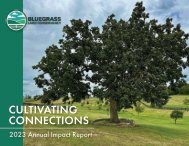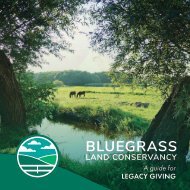BLC Conservation Easement Landowner Guide
A guide for Kentucky landowners: - What is a Conservation Easement? - Financial Benefits of Conservation Easements - About Land Trusts - Frequently Asked Questions - Landowner Stories
A guide for Kentucky landowners:
- What is a Conservation Easement?
- Financial Benefits of Conservation Easements
- About Land Trusts
- Frequently Asked Questions
- Landowner Stories
Create successful ePaper yourself
Turn your PDF publications into a flip-book with our unique Google optimized e-Paper software.
PART 2: FINANCIAL BENEFITS OF CONSERVATION EASEMENTS<br />
Placing a qualified conservation easement on land may provide the<br />
landowner with federal tax benefits, as well as possible property tax<br />
benefits. In addition, some federal, state or local funding may be available<br />
to purchase (or partially purchase) a conservation easement, though these<br />
funds are extremely limited. It is important that landowners consult with legal,<br />
tax, and conservation professionals for more specific information on how<br />
currently available funding programs and tax incentives might work for them.<br />
FEDERAL INCOME TAX IMPLICATIONS<br />
The federal income tax benefits of donating a conservation easement work<br />
similarly to other types of charitable contributions. A landowner may be able to<br />
deduct up to the full value of the conservation easement from his or her federal<br />
income taxes. The easement value is determined by a qualified, independent<br />
appraiser.<br />
<strong>Conservation</strong> easement donations enjoy enhanced deductibility over other<br />
charitable contributions; allowing landowners to deduct a greater portion of<br />
their Adjusted Gross Income for a greater number of years (carry forward).<br />
Consultation with legal and tax professionals is advised to determine current<br />
tax and financial implications.<br />
A conservation easement donation can qualify as a charitable<br />
contribution under IRS regulations if:<br />
A. It is granted in perpetuity;<br />
B. It is granted to a qualified organization, either:<br />
1. A nonprofit, 501(c)(3) charitable organization (i.e., a land trust) with a<br />
conservation purpose and the means to enforce the conservation easement,<br />
or<br />
2. A local, state or federal governmental entity empowered to hold real<br />
property interests;<br />
C. It achieves at least one of the following conservation purposes:<br />
1. Preserves land for public outdoor recreation or education;<br />
2. Protects relatively natural habitats of fish, wildlife or plants;<br />
3. Preserves open space, either for scenic enjoyment or in keeping with a<br />
clearly delineated public policy (such as a local open space plan); and/or<br />
4. Preserves historically important land or certified historic structures.<br />
11












